The U.S. Federal Communications Commission (FCC) yesterday, voted along party lines on to repeal landmark 2015 rules that intended to ensure a free and open Internet. Protesters immediately gathered to oppose the change.
The 3-2 ruling began a court fight over a move that opponents fear will recast the digital landscape.
The meeting was evacuated before the vote for about 10 minutes. Commission Chairman Ajit Pai said upon ‘advice from security,’ and resumed after sniffer dogs checked the building.
An FCC official said that police had concerns after a bomb threat was phoned in.
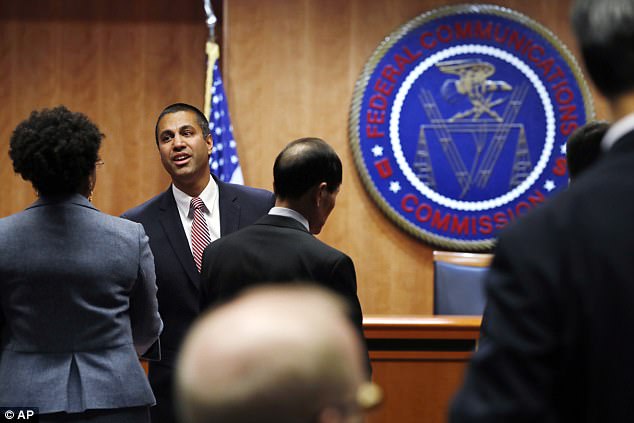
Federal Communications Commission (FCC) Chairman Ajit Pai, left, greeted witnesses before Thursday’s meeting to vote on net neutrality
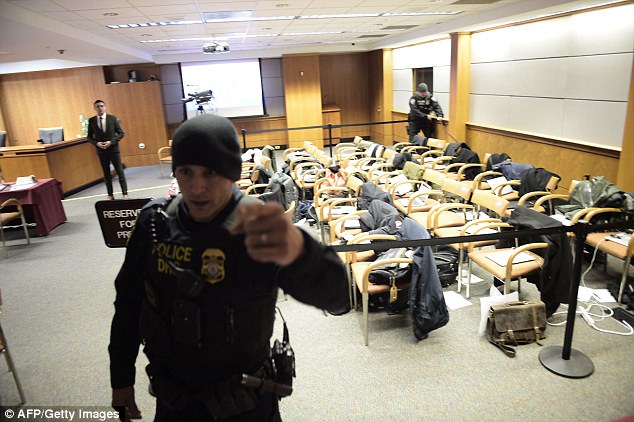
Homeland Security police evacuated the hearing room briefly after a bomb threat was phoned in
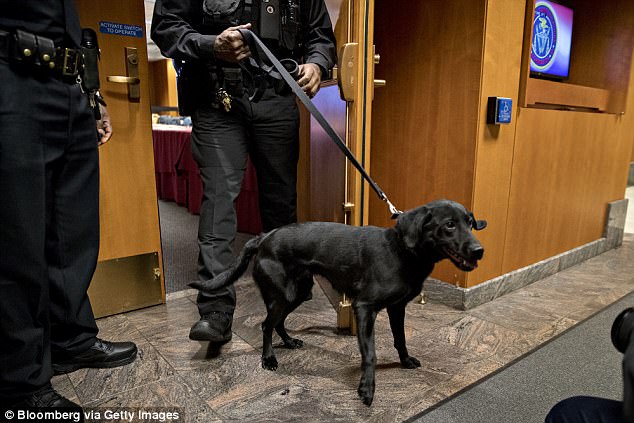
After the bomb threat was called in, officers evacuated the FCC’s headquarters and called in the dogs
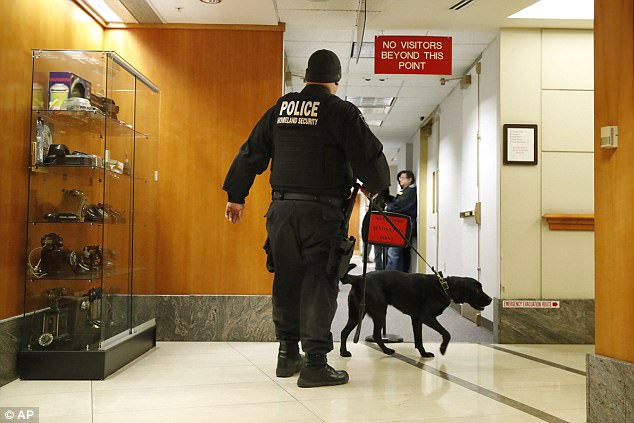
Bomb-sniffing dogs were brought in to sweep the building and clear it before the hearing could resume
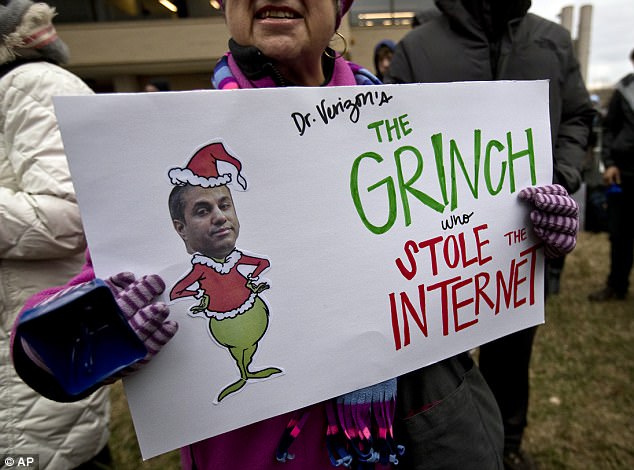
Diane Tepfer hed a sign with an image of Pai as the ‘Grinch who Stole the Internet’ during a Washington, D.C. protest outside FCC headquarters
Pai’s victory is a win for internet service providers like AT&T Inc., Comcast Corp., and Verizon Communications Inc. all of which opposed the regulations, popularly known as ‘net neutrality’ rules. This new ruling hands them the power over what web content consumers can access.
Companies like Google parent Alphabet Inc. and Facebook Inc., Democrats, Hollywood all urged Pai, a Republican appointed by President Donald Trump, not to rescind the Obama-era rules barring service providers from blocking, slowing access to or charging more for certain content.
Democrats, Hollywood, and Consumer advocates and trade groups representing content providers have all planned a legal challenge aimed at preserving those rights.
White House press secretary Sarah Sanders told reporters on Thursday that ‘the administration supports the FCC’s efforts. And at the same time, the White House certainly has and always will support a fair and free Internet.’
Someone called in a bomb threat during the FCC vote. Eventually the💣 emoji will be similar to the 🔫 emoji #NetNeutrality pic.twitter.com/IEOqcI7V3O
— Adam Felibrico (@AdamFelibrico) December 14, 2017
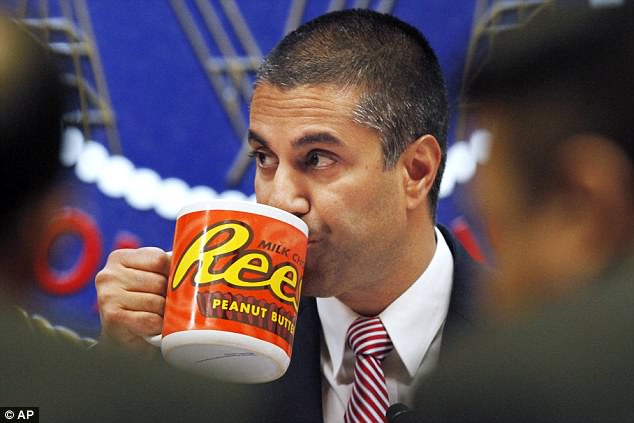
The 3-2 vote to rescind net neutrality rules could usher in big changes in how Americans use the Internet, according to consumer advocates
Democrat and daughter of South Carolina Rep. James Clyburn, FCC Commissioner Mignon Clyburn, said in the run-up to the vote that Republicans were ‘handing the keys to the Internet’ to a ‘handful of multi-billion dollar corporations.’
Protesters outside, raising a clenched fist before the hearing began were addressed by Clyburn. Pai has argued that the 2015 rules were heavy-handed and stifled competition and innovation among service providers.
‘The Internet wasn’t broken in 2015. We weren’t living in a digital dystopia. To the contrary, the internet is perhaps the one thing in American society we can all agree has been a stunning success,’ he said on Thursday.
Companies like Netflix, worried about speed-throttling and other barriers to video streaming, lashed out quickly.
‘We’re disappointed in the decision to gut #NetNeutrality protections that ushered in an unprecedented era of innovation, creativity & civic engagement. This is the beginning of a long legal battle. Netflix stands w/ innovators, large & small, to oppose this misguided FCC order,’ the company tweeted.
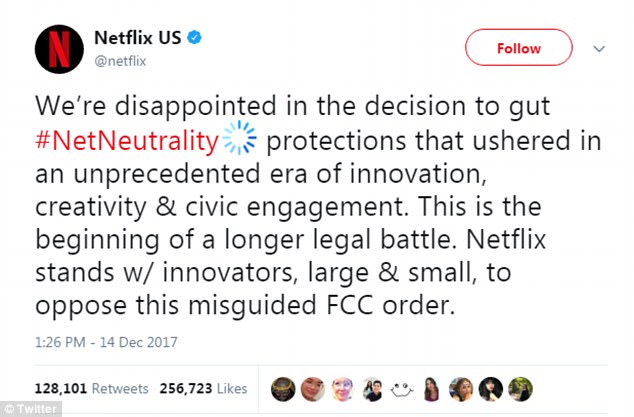
Netflix was not amused on Thursday, tweeting its disappointment at the FCC’s move
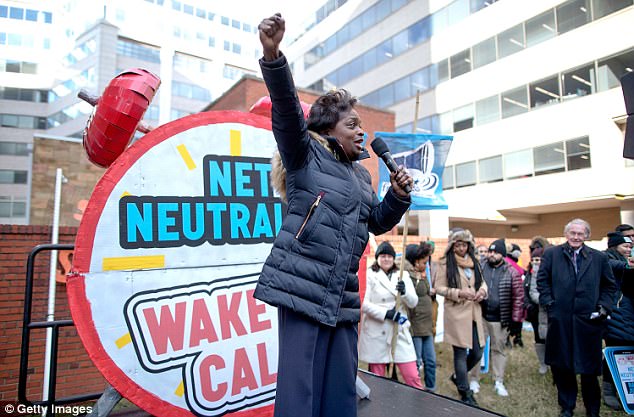
FCC Commissioner Mignon Clyburn, a Democrat and daughter of South Carolina Rep. James Clyburn, rallied with protesters outside the hearing room
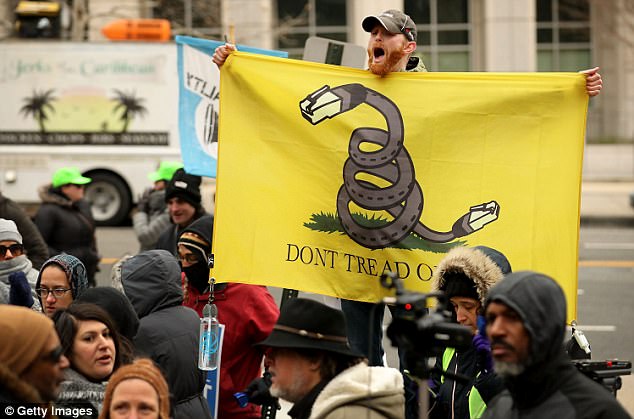
Net neutrality rules prevented internet service providers from creating different levels of service and blocking or promoting individual companies and organizations on their systems
Consumers will not see any immediate changes, but smaller startups worry the lack of restrictions could drive up costs or lead to their content being blocked.
Internet service providers say consumers will see no change and argue that the largely unregulated internet worked fine in the two decades before the order was adopted. They said that they will not block or throttle legal content but that they may engage in paid prioritization.
Democrats said the proposal is deeply unpopular and they will ultimately prevail in protecting the rules, either in the courts or in U.S. Congress.
In a written dissent released on Thursday that the decision grants internet providers ‘extraordinary new power’ from the FCC, said FCC Commissioner Jessica Rosenworcel, a Democrat.
‘They have the technical ability and business incentive to discriminate and manipulate your internet traffic. Moreover, now this agency gives them the legal green light to go ahead,’ she said.
Several state attorneys general have said they will oppose the ruling, citing problems with comments made to the FCC during the public comment period. Other critics have said they will consider challenging what they believe to be weaker enforcement.
Net neutrality supporters rallied in front of the FCC building in Washington before the vote. Ssome Congress members were expected to join.
Amid chants of ‘Hey hey, ho ho, Chairman Pai has got to go!’, several dozen people stood in the cold to hear activists speak out against the change.
Protesters included celebrities like ‘Star Wars’ actor Mark Hamill.
Pai proposes allowing those practices as long as they are disclosed since the 2015 rules were intended to give consumers equal access to web content and prevent broadband providers from favoring their content.
Michael Powell, a former FCC chairman who heads a trade group representing major cable companies and broadcasters, told reporters earlier this week that internet providers would not block content because it would not make economic sense.
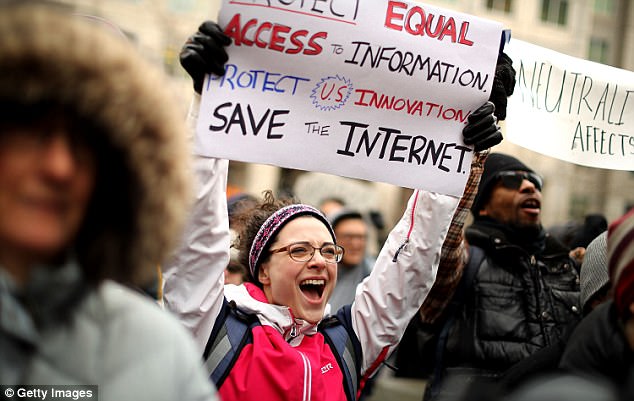
A University of Maryland poll released this week found that more than 80 percent of respondents opposed the proposal to rescind the rules
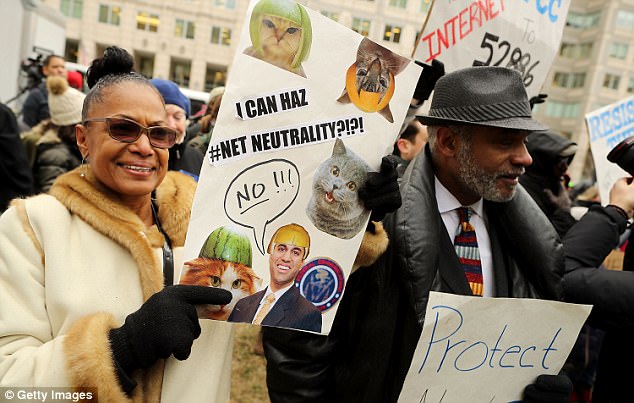
Democrats say they will ultimately prevail in protecting the rules, either in the courts or in U.S. Congress.
‘They make a lot of money on an open internet,’ Powell said, adding it is ‘much more profitable’ than a closed system. ‘This is not a pledge of good-heartedness, it’s a pledge in the shareholders’ interest.’
More than 80 percent of respondents opposed the proposal according to a University of Maryland poll released this. The survey of 1,077 registered voters was conducted online by the Program for Public Consultation at the University of Maryland from Dec. 6-8.
Democrats said that they would work to overturn the proposal if it is approved and the absence of rules would be unacceptable. Advocates of the net neutrality rules plan a legal challenge.
Pai’s proposal is ‘like letting the bullies develop their own playground rules,’ said Democratic Senator Ed Markey.
A majority of Republicans back Pai’s proposal but want Congress to write net neutrality rules. Senate Majority Leader Mitch McConnell said the FCC would ‘return the internet to a consumer-driven marketplace free of innovation-stifling regulations.’
Twenty state attorneys general asked the FCC to delay the vote until the issue of fake comments is addressed.
If you know someone who might like this, please click “Share!”
